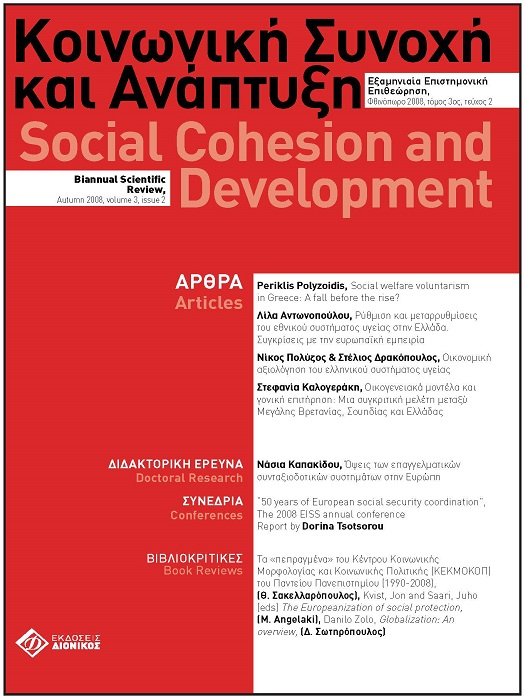Όψεις των επαγγελματικών συνταξιοδοτικών συστημάτων στην Ευρώπη: μια βιβλιογραφική επισκόπηση
Abstract
Tα δημόσια συνταξιοδοτικά συστήματα αντι-
μετωπίζουν, λόγω των δημογραφικών κυρίως
εξελίξεων, σημαντικές προκλήσεις που οδη-
γούν σε μεταρρυθμίσεις στα κράτη-μέλη και
σε επανεξέταση των βασικών προτεραιοτήτων
και των εργαλείων πολιτικής για τις συντάξεις.
Eνα από τα σημαντικά στοιχεία των μεταρρυθ-
μίσεων υπήρξε η ανάπτυξη και ενίσχυση των
επαγγελματικών συνταξιοδοτικών σχημάτων.
Πέραν των κοινών χαρακτηριστικών τους, τα
επαγγελματικά-συμπληρωματικά συνταξιοδο-
τικά συστήματα παρουσιάζουν βαθιές δομικές
διαφορές στα κράτη-μέλη της Ευρωπαϊκής
Ένωσης .Σκοπός του παρόντος άρθρου είναι
η ανάδειξη της ποικιλίας των επαγγελματικών
συνταξιοδοτικών συστημάτων και η αποτύπω-
ση των κύριων χαρακτηριστικών γνωρισμάτων
που συγκροτούν το πλαίσιο λειτουργίας του
θεσμού σε διάφορα κράτη-μέλη.
Article Details
- Zitationsvorschlag
-
Καπακίδου Ν. (2016). Όψεις των επαγγελματικών συνταξιοδοτικών συστημάτων στην Ευρώπη: μια βιβλιογραφική επισκόπηση. Social Cohesion and Development, 3(2), 153–168. https://doi.org/10.12681/scad.8894
- Ausgabe
- Bd. 3 Nr. 2 (2008)
- Rubrik
- Doctoral Research

Dieses Werk steht unter der Lizenz Creative Commons Namensnennung - Nicht-kommerziell - Weitergabe unter gleichen Bedingungen 4.0 International.
Authors who publish with this journal agree to the following terms:
- Authors retain copyright and grant the journal right of first publication with the work simultaneously licensed under a Creative Commons Attribution Non-Commercial License that allows others to share the work with an acknowledgement of the work's authorship and initial publication in this journal.
- Authors are able to enter into separate, additional contractual arrangements for the non-exclusive distribution of the journal's published version of the work (e.g. post it to an institutional repository or publish it in a book), with an acknowledgement of its initial publication in this journal.
- Authors are permitted and encouraged to post their work online (preferably in institutional repositories or on their website) prior to and during the submission process, as it can lead to productive exchanges, as well as earlier and greater citation of published work (See The Effect of Open Access).



